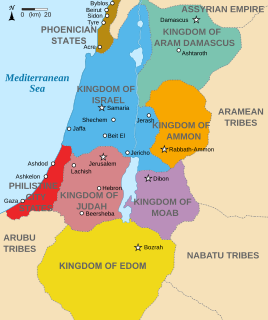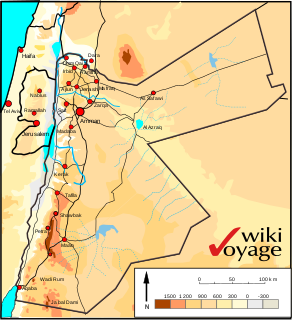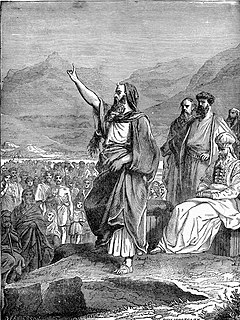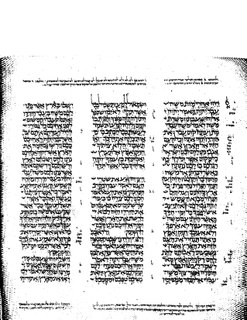Related Research Articles

Ammon was an ancient Semitic-speaking nation occupying the east of the Jordan River, between the torrent valleys of Arnon and Jabbok, in present-day Jordan. The chief city of the country was Rabbah or Rabbat Ammon, site of the modern city of Amman, Jordan's capital. Milcom and Molech are named in the Hebrew Bible as the gods of Ammon. The people of this kingdom are called "Children of Ammon" or "Ammonites".

The Book of Ruth is included in the third division, or the Writings (Ketuvim), of the Hebrew Bible. In most Christian canons it is treated as one of the historical books and placed between Judges and 1 Samuel.

Moab is the name of an ancient Levantine kingdom whose territory is today located in the modern state of Jordan. The land is mountainous and lies alongside much of the eastern shore of the Dead Sea. The existence of the Kingdom of Moab is attested to by numerous archaeological findings, most notably the Mesha Stele, which describes the Moabite victory over an unnamed son of King Omri of Israel, an episode also noted in 2 Kings 3. The Moabite capital was Dibon. According to the Hebrew Bible, Moab was often in conflict with its Israelite neighbours to the west.
The Moabite language, also known as the Moabite dialect, is an extinct sub-language or dialect of the Canaanite languages, themselves a branch of Northwest Semitic languages, formerly spoken in the region described in the Bible as Moab in the early 1st millennium BC. The body of Canaanite epigraphy found in the region is described as Moabite; this is limited primarily to the Mesha Stele and a few seals. Moabite, together with the similarly poorly-attested Ammonite and Edomite, belonged to the dialect continuum of the Canaanite group of northwest Semitic languages, together with Hebrew and Phoenician.
The Hebrew Bible is considered a holy text in most Abrahamic religions. It records a large number of events and laws that are endorsed or proscribed by the God of Israel. Judaism teaches that the Torah contains 613 commandments, many of which deal with crime and punishment, but only the Noahide Laws apply to humanity in general. Most Christian denominations have also adopted some of these directives, such as the Ten Commandments and Great Commandment, while a minority believes all Old Covenant laws have been abrogated.

Mount Seir is the ancient and biblical name for a mountainous region stretching between the Dead Sea and the Gulf of Aqaba in the northwestern region of Edom and southeast of the Kingdom of Judah. It may also have marked the older historical limit of Ancient Egypt in Canaan. A place called "Seir, in the land of Shasu", thought to be near Petra, Jordan, is listed in the temple of Amenhotep III at Soleb.
According to the Hebrew Bible, the Zuzim or Zuzites were a tribe who lived in Ham, a land east of the Jordan River between Bashan and Moab. The etymology of the name is unknown, but may derive from the Hebrew zīz which roughly translates to "moving things"/"things which move".
Aroer is a biblical town on the north bank of the River Arnon to the east of the Dead Sea, in present-day Jordan. The town was an ancient Moabite settlement, and is mentioned in the Bible.

The Paleo-Hebrew script, also Palaeo-Hebrew, Proto-Hebrew or Old Hebrew, is the writing system found in Canaanite inscriptions from the region of biblical Israel and Judah. It is considered to be the script used to record the original texts of the Hebrew Bible due to its similarity to the Samaritan script, as the Talmud stated that the Hebrew ancient script was still used by the Samaritans. The Talmud described it as the "Libona'a script", translated by some as "Lebanon script". Use of the term "Paleo-Hebrew alphabet" is due to a 1954 suggestion by Solomon Birnbaum, who argued that "[t]o apply the term Phoenician to the script of the Hebrews is hardly suitable".
Some translators of the biblical book of Deuteronomy translate Pisgah as a name of a mountain, usually referring to Mount Nebo. The word פִּסְגָּה literally means "summit". The region lies directly east of the Jordan River and just northeast of the Dead Sea. Mount Nebo is the highest among a handful of Pisgah summits; an arid cluster of hilltops on the western edge of the Trans-Jordanian Plateau. Arabic names for Pisgah include: Fasga (Phasga), Jabal Siyāgha, Rās as-Siyāgha and Rujm Siyāgha.

Wadi Mujib, also known as Arnon Stream, is a river in Jordan. The river empties into the Dead Sea circa 420 metres (1,380 ft) below sea level. Today, Wadi Mujib is fed by seven tributaries. The western part of the river is the site of the Mujib Biosphere Reserve, popular for hikes & canyoning amid dramatic rock formations.
In the Hebrew Bible, as well as non-Jewish ancient texts from the region, the Northwest Semitic term Rephaite or Repha'im refers either to a people of greater-than-average height and stature in Deuteronomy 2:10-11, or departed spirits in the Jewish afterlife, Sheol as written in the following scriptures: Isaiah 26:14; Psalms 88:11, and Proverbs 9:18, as well as Isaiah 14:9.

Devarim is the 44th weekly Torah portion in the annual Jewish cycle of Torah reading and the first in the Book of Deuteronomy. It comprises Deuteronomy 1:1–3:22. The parashah recounts how Moses appointed chiefs, the episode of the Twelve Spies, encounters with the Edomites and Ammonites, the conquest of Sihon and Og, and the assignment of land for the tribes of Reuben, Gad, and Manasseh.

Mount Horeb is the mountain at which the Ten Commandments were given to Moses by Yahweh, according to the Book of Deuteronomy in the Hebrew Bible. It is described in two places as הַר הָאֱלֹהִים the "Mountain of God". The mountain is also called the Mountain of YHWH.
Aram is a son of Shem, according to the Table of Nations in Genesis 10 of the Hebrew Bible, and the father of Uz, Hul, Gether and Mash or Meshech. The Book of Chronicles lists Aram, Uz, Hul, Gether, and Meshech as descendants of Shem, although without stating explicitly that Aram is the father of the other four.

Transjordan is an area of land in the Southern Levant lying east of the Jordan River valley. It is also alternatively called Gilead.

Joshua 6 is the sixth chapter of the Book of Joshua in the Hebrew Bible or in the Old Testament of the Christian Bible. According to Jewish tradition the book was attributed to Joshua, with additions by the high priests Eleazar and Phinehas, but modern scholars view it as part of the Deuteronomistic History, which spans the books of Deuteronomy to 2 Kings, attributed to nationalistic and devotedly Yahwistic writers during the time of the reformer Judean king Josiah in 7th century BCE. This chapter focuses on the Battle of Jericho under the leadership of Joshua, a part of a section comprising Joshua 5:13–12:24 about the conquest of Canaan.
Transjordan, the East Bank, or the Transjordanian Highlands, is the part of the Southern Levant east of the Jordan River, mostly contained in present-day Jordan.

Numbers 31 is the 31st chapter of the Book of Numbers, the fourth book of the Pentateuch (Torah), the central part of the Hebrew Bible, a sacred text in Judaism and Christianity. Scholars such as Israel Knohl and Dennis T. Olson name this chapter the War against the Midianites.
References
- J.H. Hertz (1936) The Pentateuch and Haftoras. Deuteronomy. Oxford, Oxford University Press.